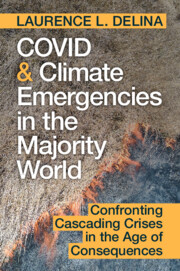 COVID and Climate Emergencies in the Majority World
COVID and Climate Emergencies in the Majority World Book contents
- COVID and Climate Emergencies in the Majority World
- Reviews
- COVID and Climate Emergencies in the Majority World
- Copyright page
- Dedication
- Contents
- Preface
- Acknowledgements
- 1 Portrait of a Grief
- 2 Collapsing Dominoes
- 3 Vulnerabilities Amplified
- 4 Walled World
- 5 Obscene Opulence
- 6 Climate Nationalism
- 7 Toggling the System
- 8 Decluttering Consumption
- 9 Confronting Neo-Liberalism
- 10 Ceasing Arrogance
- 11 Making Amends
- 12 Collective Solidarities
- 13 Decolonising from Within
- 14 Indigenous Epistemology
- 15 Communicating Risks
- 16 The Hubris of Control
- 17 Mobilising the 3.5 Per Cent
- Index
- References
3 - Vulnerabilities Amplified
Published online by Cambridge University Press: 22 June 2023
- COVID and Climate Emergencies in the Majority World
- Reviews
- COVID and Climate Emergencies in the Majority World
- Copyright page
- Dedication
- Contents
- Preface
- Acknowledgements
- 1 Portrait of a Grief
- 2 Collapsing Dominoes
- 3 Vulnerabilities Amplified
- 4 Walled World
- 5 Obscene Opulence
- 6 Climate Nationalism
- 7 Toggling the System
- 8 Decluttering Consumption
- 9 Confronting Neo-Liberalism
- 10 Ceasing Arrogance
- 11 Making Amends
- 12 Collective Solidarities
- 13 Decolonising from Within
- 14 Indigenous Epistemology
- 15 Communicating Risks
- 16 The Hubris of Control
- 17 Mobilising the 3.5 Per Cent
- Index
- References
Summary
The pandemic, coupled with weather extremes and the possibility of violent global conflicts, evokes the wicked nature of contemporary human challenges. These cascading risks reveal the true character of the social fabric and expose its frailties. With vulnerabilities amplified, we are catapulted to a world of miseries.
- Type
- Chapter
- Information
- COVID and Climate Emergencies in the Majority WorldConfronting Cascading Crises in the Age of Consequences, pp. 19 - 25Publisher: Cambridge University PressPrint publication year: 2023
